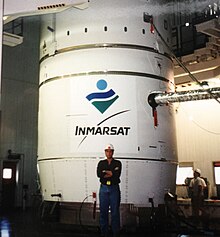Inmarsat-3 F4
| Mission type | Communications |
|---|---|
| Operator | Inmarsat |
| COSPAR ID | 1997-027A |
| SATCAT no. | 24819 |
| Mission duration | 13 years (planned) 19 years (achieved) |
| Spacecraft properties | |
| Bus | AS-4000 |
| Manufacturer | Lockheed-Martin Astro Space |
| Launch mass | 2,068 kg (4,559 lb) |
| Start of mission | |
| Launch date | 3 June 1997, 23:20:06 UTC |
| Rocket | Ariane 44L (V97) |
| Launch site | Centre Spatial Guyanais, ELA-2 |
| Contractor | Arianespace |
| End of mission | |
| Disposal | Graveyard orbit |
| Deactivated | 2016 |
| Orbital parameters | |
| Reference system | Geocentric orbit |
| Regime | Geostationary orbit |
| Longitude | 54° West |
| Transponders | |
| Coverage area | Atlantic Ocean |
Inmarsat-3 F4 is a communications satellite operated by the British satellite operator Inmarsat. It was launched into a geosynchronous orbit on 4 June 1997 from the Guiana Space Centre in Kourou, French Guiana. It was located at 54° West longitude whilst in service, providing coverage of the Americas as Atlantic Ocean Region-West (AOR-W). It was replaced by Inmarsat-3 F5 at 54° West in February 2016, and the now retired Inmarsat-3 F4 was moved to parking at 144° West.[1][2]
The Inmarsat 3 series spacecraft (F1 thru F5) were built by Lockheed-Martin Astro Space as the prime contractor. Lockheed-Martin was responsible for the basic spacecraft bus, and the European Matra Marconi Space, developed the advanced communications payload.
The Inmarsat 3 communications payload can generate a global beam and a maximum of seven spotbeams. The spotbeams are directed as required to make extra communications capacity available in areas where demand from users is high.
The spacecraft was built using an AS-4000 satellite bus. It has a mass of 2,068 kg (4,559 lb), and is expected to operate for 13 years.[3]
In the United States, Inmarsat ground stations are licensed to operate at 1525-1559 MHz and 1626.5-1660.5 MHz via a mechanism called the ISAT List. The 1544-1545 MHz and 1645.5-1646.5 MHz bands are reserved for safety and distress communications.[4]

See also
[edit]References
[edit]- ^ "PETITION FOR DECLARATORY RULING". Federal Communications Commission. Retrieved 24 March 2018.
 This article incorporates text from this source, which is in the public domain.
This article incorporates text from this source, which is in the public domain.
- ^ "REQUEST FOR SPECIAL TEMPORARY AUTHORITY". Federal Communications Commission. Retrieved 24 March 2018.
 This article incorporates text from this source, which is in the public domain.
This article incorporates text from this source, which is in the public domain.
- ^ Krebs, Gunter (11 December 2017). "Inmarsat-3 F1, 2, 3, 4, 5". Gunter's Space Page. Retrieved 10 October 2021.
- ^ "ISAT List". Federal Communications Commission. Retrieved 24 March 2018.
 This article incorporates text from this source, which is in the public domain.
This article incorporates text from this source, which is in the public domain.
